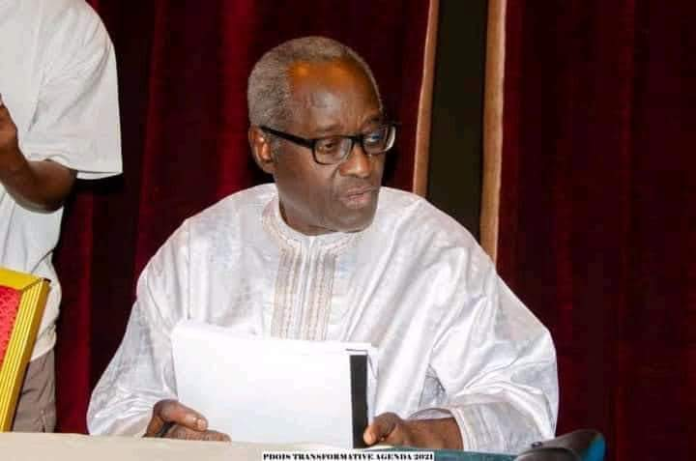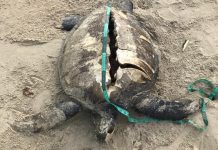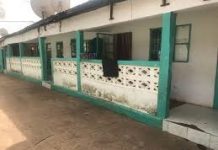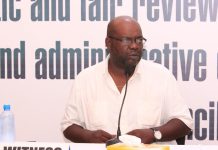By Demba Bah
Halifa Sallah, on Saturday, September 21 2024 explained PDOIS’ alternative economic policy required to transform The Gambia. He was speaking at the Annual General Meeting (AGM) of the PDOIS European Branch in London.
The Secretary General of the party was invited to speak on issues confronting the nation. In his presentation, he disclosed to members the state of the Gambian economy by highlighting the role of the central bank. He said the Central Bank of the Gambia is the most important institution today. “It is the depository of public wealth and relies on taxation and other sources of revenue to put in its coffers. It determines the monetary policy, supervises other (commercial) banks and insurance companies to ensure that investment goes to the productive base of the economy.”
He quoted the Minister of Finance and Economic Affairs who, last year, indicated that the net foreign assets of the country and the central bank are plunging. He said that is because Gambia is exporting only groundnuts, cashew nuts and fish to countries like United Kingdom, India and Turkey, and generating about 270 million dollars, while importing rice, other cereals, oil and electricity from Senegal at a cost of over 700 million dollars. “Therefore, the earning capacity is in a state of deficit which impacts on the foreign assets of our central bank. We become captives of the IMF because of a deficit needing a loan for a balance of payments support,” he said.
The Secretary General of PDOIS said that must change. Other than the agrarian economy, there must also be industrial development which only contributes 20% of GDP, he noted. He said according to the Minister of Finance and Economic Affairs, industry in 2023 constituted construction, electricity, mining at quarries, etc. Halifa reminded members that electricity is being imported from Senegal, most of the construction materials are also imported and mining is limited to sand mining. That is our industry according to the Minister, Halifa pointed out.
“Consequently, we have duty waivers amounting to over 2 billion dalasi in 2022 and over 3.9 billion dalasi in 2023. So, how can wealth increase?” he asked.
“That is why borrowing has increased, requiring 7.5 billion dalasi in debt service in 2024. That is the state of our economy,” he emphasized.
“PDOIS is saying invest in the productive base through the accumulation of Sovereign National wealth. We are a country of 11,285 square kilometres of territory; land, sea and air belong to us. Whatever is there in wealth is sovereign National Wealth. That is what PDOIS is telling you. We own that. That is why we fought for liberation and got rid of the colonialist so that we can take ownership of our land,” he noted.
“What justification can we give to a Gambian who wants land and cannot get land? Do we call ourselves liberated if we want land and cannot get land in our homeland? That will never happen under a PDOIS government,” he promised.
“We say foreign direct investment; in other areas of our economy, but not to take over the land of our people, employ women who grow the vegetables and get paid starvation wages.”
He said the question PDOIS has ever asked is, “can we feed ourselves?” The Minister of agriculture once quoted what PDOIS has indicated in its manifesto that there is 550,000 hectares of land available for cultivation. Each hectare could produce at least 5 tons of rice. Therefore, how much land is needed to produce 300,000 tons of rice? Is the land there, yes, he answered. PDOIS is saying invest in the productive base so that agricultural produce can be transformed into value added products. “We will produce our own soap, milk, all sorts of needed products. It is possible to do it in small and large scale by ensuring those who want to engage in processing these agricultural produce can get the type of support needed. Employment will be generated. Import lowered and production enhanced.
Halifa said the country is being informed about mining in Batukunku, Sanyang and Kartong but what is being generated is unknown. He stressed the need to have a system where everything owned will be in sovereign hands.
“The government elected will see to it that there is a country divided into regions, each region developed. The starting point of development is the villages. Each village will have a village development committee to help villagers understand their earning capacity which will be retained at the village level. It does not leave”.
What the committee will look at next is the village/ward development plan to know what constitutes the needs of the people for all aspects of social development. That will form the body of the annual national budget so that all parts of the country developed together. There will be no rural-urban drift or migration to other parts of the world.” That, Halifa said is what the law of balanced and proportionate development of society is about. That is what PDOIS is talking about as a policy which never existed. The wealth of the country will be distributed according to the needs of the people. That is the system PDOIS is talking about, which will eradicate poverty. The current system he argued increases poverty.
He concluded his deliberation on the state of the economy with an advice to PDOIS members that; “they should not allow the party to be judged by the number of seats in parliament, councils or election results. Those doing that are looking at history with the wrong lenses. PDOIS is interested in changing lives and livelihoods of its people. Those who want to be part of the journey should know the history. PDOIS has been an asset to this country and all other political parties,” he asserted.
Halifa then moved on the constitutional reform process which he said started in 2017. This will be published in tomorrow’s edition





















